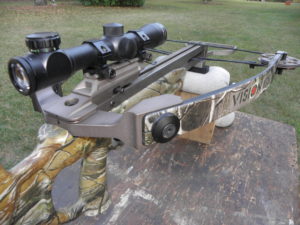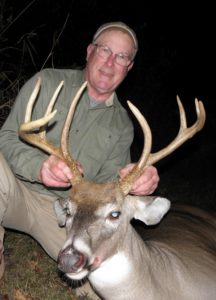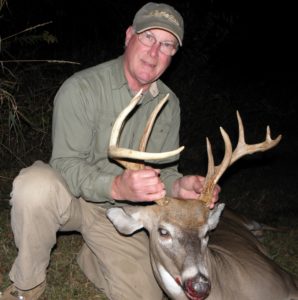The language filed by the anti-hunting group would remove mountain lions and bobcats from the state’s list of huntable species. Under the proposed language, mountain lions and bobcats, along with jaguars, ocelots and lynx, would be called “wild cats,” and be prohibited from hunting or trapping. Read more
The Buck Stopped Here
By Glen Wunderlich
The southeast wind had changed my plans for the opening afternoon of archery deer season. However, strategic options were in place and it was time to head to a little-used ladder stand overlooking a trail through the trees. It wasn’t the most comfortable stand but it was one of the few that would position me properly to exploit the benefits of hunting with the slight breeze in my face.
Opening day usually means more of a scouting experience – a way to gather information that could be used on future hunts. Little did I know that this would be my last archery stand of the generous season with my Horton Vision crossbow.
My friend, Joe and his lady friend, Diane, would occupy a two-person portable ground blind at the edge of a lush 4-acre food plot looking into the wind. It wasn’t long before Joe radioed to inform me that two 8-point bucks were locking antlers and putting on quite a show.
Meanwhile, I had nothing to report other than some annoying ground squirrels that kept me on alert, while the sun succumbed to prime time.
Over the airwaves, Joe indicated there was a much larger buck that had entered the picture, but at some 60 yards, it was beyond ethical for a reasonable chance and never got closer to him. Then, he watched as a 9-point buck had appeared and moved to about 20 yards of his blind, but one careless movement on Joe’s part sent the quality deer back into the tall trees for good.
Two raccoons kept my attention, as they foraged for acorns in a nearby oak tree after sunset. With darkness descending, a yearling 6-point buck could be heard, as it traveled along the trail heading my way. I had already made up my mind to pass on the youngster, when it stopped directly in front of me at 15 yards. With its nose to the ground, it was sniffing the deer urine I collected from “yellow snow” and had applied to my rubber boots as scent cover.
Behind the yearling on the same trail came another deer and I could make out some headgear in the waning light. It was adorned with some unusual tines that were obviously rather long, although I never took the time to start counting them. This larger buck converged on the spot with the inquisitive 6-point buck and came to a stop.
At the sound of the arrow’s launch, both bucks sped off into the trees, but the unmistakable lighted nock hit its mark as the brilliant red light danced out of sight. Experience dictated it was time to relax and I headed back for a field-dressing kit, where Joe, Diane, and I would prepare for recovery of the prize.
We picked up the blood trail and found the expired buck no more than 50 yards from the site of the encounter.
After field dressing the animal, we hung it in the cool 40-degree air for the night and got it to the processor after icing it down the next day, because of the unseasonably warm temperatures.
At the Rose Lake deer check station, workers confirmed the buck to be no less than 3 ½ years old, but the age will still be checked in Iowa, as it is tested for Chronic Wasting Disease.
The season was short, but it couldn’t have been sweeter.









